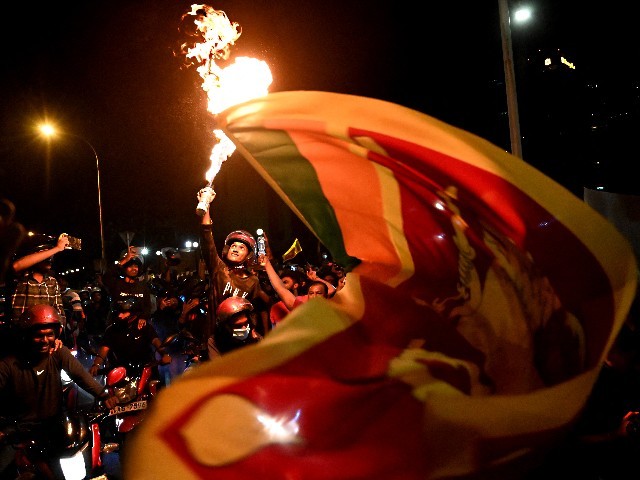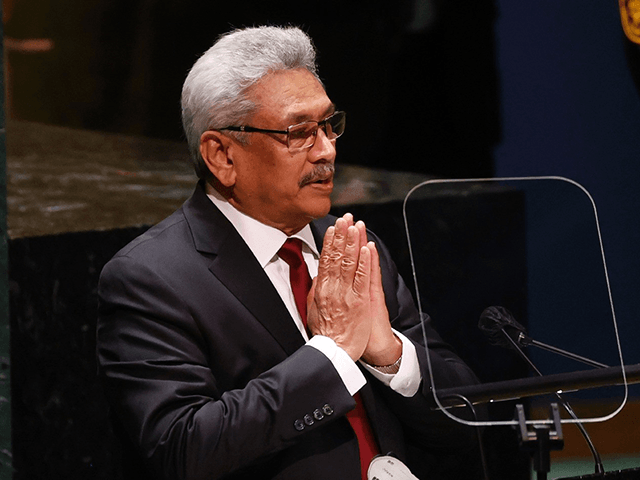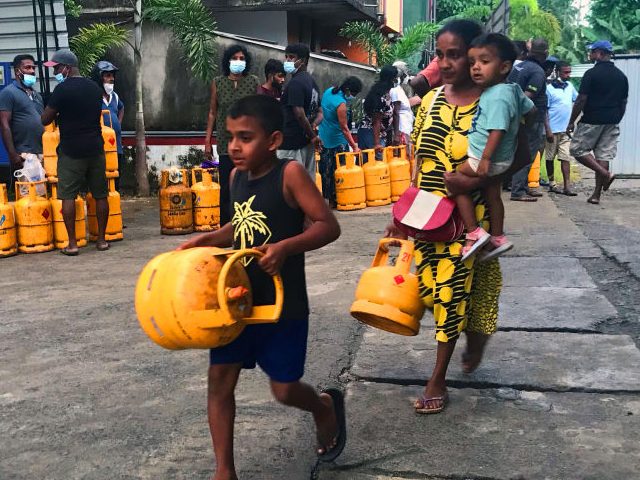Sri Lankan Prime Minister Ranil Wickremesinghe said on Saturday that his country might increase its purchases of discounted oil from Russia, and accept more financial assistance from China, as the island nation spirals deeper into an economic crisis.
Wickremesinghe admitted to the Associated Press that Sri Lanka is mired in a crisis of “its own making.”
Sri Lanka has been ruled for decades by a single family, that of President Gotabaya Rajapaksa. Several members of the president’s family held multiple cabinet-level offices at the same time, establishing a corrupt and nepotistic system that indulged in wild socialist spending binges to keep the population quiescent, financed by easy money from China. Sri Lanka is officially a “democratic socialist republic.”
The Rajapaksa family’s irresponsible spending habits were coupled with the sort of extremely unwise managerial policies that might be expected when unqualified officials hold multiple ministerial positions based solely on their last names. The Rajapaksa aristocracy managed to create shortages of everything from food and fuel to toilet paper while simultaneously racking up over $50 billion in external debt. Sri Lanka defaulted on $7 billion of its debt last month.
Economic shocks from the Wuhan coronavirus pandemic and the Russian invasion of Ukraine hit the tottering Sri Lankan system like hammer blows and left the island literally struggling to keep its lights on, while angry mobs took to the streets and various Rajapaksas suddenly lost their taste for pretending to be government ministers. President Gotabaya Rajapaksa, however, refuses to step down.
Wickremesinghe, who is also the finance minister, became prime minister a month ago when the president’s brother Mahinda resigned. He acknowledged his government’s role in creating the current crisis, but since Western governments and international institutions have grown wary of plowing more billions into the Sri Lankan system, President Rajapaksa has little choice but to seek aid from Russia and China.
The AP said Wickremesinghe declined to comment on reports that Sri Lanka already bought almost 100,000 tons of crude oil from Russia to restart its oil refinery and claimed he did not know if other deals had already been signed with Russian suppliers.
“If we can get from any other sources, we will get from there. Otherwise, [we] may have to go to Russia again,” he said.
“There is a lot of oil going around which can be sourced back informally to Iran or to Russia,” he said. “Sometimes we may not know what oil we are buying.”

Protestors take part in a demonstration against the economic crisis in Colombo, Sri Lanka, on April 9, 2022. (SHARA S. KODIKARA/AFP via Getty Images)

Sri Lankan President Gotabaya Rajapaksa addresses the 76th session of the UN General Assembly on September 22, 2021, in New York. (JOHN ANGELILLO/AFP via Getty Images)
The prime minister dismissed concerns that his country’s excessive reliance on Chinese money is making other investors and international funds nervous about sending more money to Sri Lanka, especially since China has already displayed a penchant for grabbing important pieces of the country when loan payments are not made promptly.
“We need to identify what are the projects that we need for economic recovery and take loans for those projects, whether it be from China or from others. It’s a question of where do we deploy the resources?” he said.
“China has agreed to come in with the other countries to give relief to Sri Lanka, which is a first step. This means they all have to agree (on) how the cuts are to take place and in what manner they should take place,” he said, referring to Sri Lanka’s request for China to refinance its debts.
Wickremesinghe blamed the “Ukraine crisis” for deepening Sri Lanka’s “economic contraction.”
“I think by the end of the year, you could see the impact in other countries. There is a global shortage of food. Countries are not exporting food,” he warned.
“I have generally been in governments where I ensured people had three meals and their income increased. We’ve had difficult times … but not like this,” he mused.
Another problem was added to Sri Lanka’s overflowing pile of woes on Monday when the head of the island’s electricity board, MMC Ferdinando, resigned following a political dispute with India.
Ferdinando claimed on Friday that Indian Prime Minister Narendra Modi pressured Sri Lankan President Rajapaksa to give an expensive wind power project to a group headed by billionaire Gautam Adani, the richest man in India and a key ally of Modi.
Rajapaksa strenuously denied Ferdinando’s allegations and demanded “responsible communication” to correct the record. No one involved was inclined to explain why a bankrupt island experiencing a severe energy crisis is wasting huge amounts of money on unreliable windmill power.
On Friday, the United Nations said Sri Lanka is “facing its worst economic crisis since independence in 1948” and could topple into a “full-blown humanitarian emergency.”
The U.N. is sending $47 million in assistance over the next four months to the hardest-hit Sri Lankans. UNICEF, the U.N. children’s fund,” estimated up to half of the island’s children require emergency assistance.

COMMENTS
Please let us know if you're having issues with commenting.